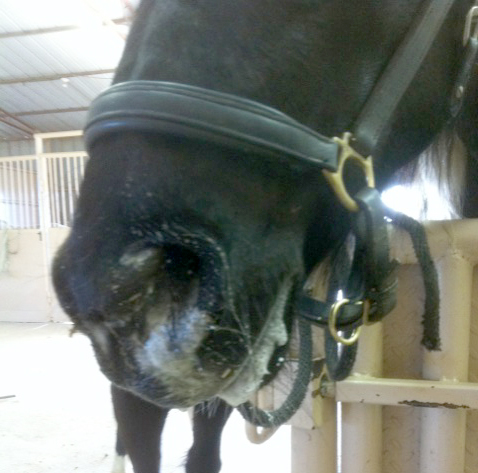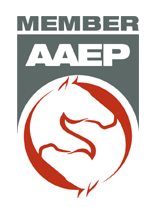Equine Esophageal ChokeBy Kenton H. Arnold, DVM
The symptoms of equine esophageal choke can vary from very subtle to quite dramatic. It does not actually cause a blockage of the trachea, so it is not the immediate crisis that we think of when people choke. The problem is when a bolus of food or hay gets stuck in the esophagus before reaching the stomach. Most often this blockage occurs where the esophagus runs more horizontally through the chest cavity. When a blockage occurs anything else that is swallowed will build up on top of the blockage making it worse. Any water or saliva that is swallowed will continue to fill the esophagus until it is so full that it runs back into the mouth and pharynx. At this time the horse will start coughing and blowing the fluid back out his nose and mouth. Most of the time the discharge will have feed particles in it. If he drops his head, then the fluid will come pouring out, and when he raises his head back up it will quit until he swallows enough saliva to cause the irritation to the pharynx again. At times he may have coughing fits that are quite dramatic. The blockage may cause some stretching of the esophagus and be painful, causing the horse to even lay and roll. If these symptoms occur it may easily be mistaken for colic, since his symptoms include an unwillingness to eat, rolling on the ground and acting painful and in some distress. If left untreated the horse will become dehydrated and more depressed. If you watch the level of the water bucket, you can easily get fooled on your horse's water consumption. The water level in the bucket will go down because the horse actually tries to drink. Under the bucket, however, will be soaked because the water will have all ran back out and on to the ground. With dehydration, your horse's symptoms of excess discharge from the mouth and nose may decrease because he is not producing as much saliva has he was before he became dehydrated. At this point the only symptoms from the horse may be depression, fever and only a slight evidence of a nasal discharge, yet it can be life threatening if not treated by your veterinarian. The most common way to treat a choke is to sedate the horse heavily, causing his head to drop below his chest. This will not only allow him to tolerate the nasogastric tube but also allow the material and flush to run back out the mouth and nose, and not down the trachea. The stomach tube is passed through the nostril and down the esophagus until the blockage stops the passage of the tube. Water is now forced down the tube and all the material is flushed from the esophagus, until the tube can be passed into the stomach. Sometimes this is a very easy procedure, and sometimes it is very difficult one that requires extensive flushing. If the horse is severely dehydrated then IV fluids are very helpful. Antibiotics are very important to prevent aspiration pneumonia since some of the fluid and material is bound to make it down the trachea. I see three major reasons for esophageal choke in horses: 1) Eating too quickly. This happens when horses are group fed and if they donít eat quickly someone more dominant is going to eat their food. This choke happens right at feeding time and may clear on its own in the first thirty minutes. Massaging the esophagus (Left side of neck along jugular furrow down to chest) for a few minutes may help it pass. 2) Teeth need floating. When a horse has bad teeth that hurt when he chews, horses will try to eat without adequately chewing the food the larger particles are more likely to get lodged in the esophagus. 3) Esophageal laxity. In older horses, and some genetic diseases, cause the esophagus to become weak and dilated. They donít have the musculature to adequately force the food down to the stomach. These horses are usually chronic chokers and require special feeding regimes.
Equine Veterinary Services
|


©2026 Website Design and Photos by Jim Arnold,
Carroll Brown Arnold and Austria Arnold Gerhardy
